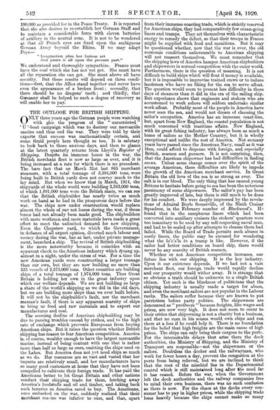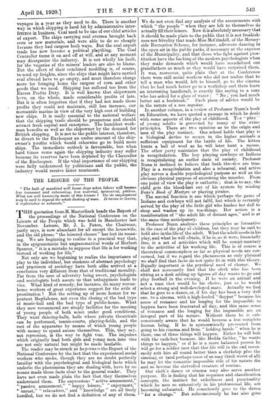1HE OUTLOOK FOR' BRITISH SHIPPING.
ONLY three years ago the German pe,ople,were watching with glee the progress of, the " unrestricted," U '-boat campaign: which, was to destroy our. mercantile marine and thus. end the: war. They were- told by their experts that success was mathematically certain, and some timid. people here. thought. so too.. It is: salutary to look back to those anxious days, and then to glance at. the latest quarterly returns from Lloyd's, Register of Skipping. Despite its immense. losses in the war, the British merchant fleet. is now as large • as. ever, and it is being increased at, a rate for which there, is no precedent. The. bare fact that on March 31st, last. 865 merchant steamers, with a total tonnage. of, 3,391,000: tons,. were being built in British- yards does not convey much to the lay mind. But when we- know that in March, 1914, the shipyards of the whole world, were, building 3,313,000, tons, of which 1,891,000 tons were the British share, we can .see that the British shipbuilder. has. nearly twice as much work, on hand as he had in the prosperous days before the- war. The ships now under construction, would' replace almost the whole of our net losses ditring.the,war, if those, losses had not alre,ady been made good. ThashiPbuilders, with more workmen. and, more materials have made a great, effort to meet the, unlimited, demand for new shipping, Even the Chepstow yard, to which the.. Government, in. defiance of all expert opinion, diverted.; much labour and. money during the war, has. at last, under private manage- ment, launcheda ship.. The revival of British shipbuilding-- is the more noteworthy because it coincides with an. apparent check to. the American industry which. gprang up, almost in a night, under the, strew of war. For a time the new American yards. were constructing. a larger tonnage. than our own, but they- are now building no more than 535 vessels of 2,573,000. tons. Other countries are building ships of a total tonnage of 1,974,000- tons, Thus Great Britain is holding her own in the great industry upon which our welfare depends. We are not building so large. a share of the world's shipping as we did in the old days,. but we are building more ships than. we ever built before.. It will not be the shipbuilder's fault, nor the merchant, seaman's fault, if there is any apparent scarcity of. ships, to bring us food and raw materials and to export our manufactures . and coal.
. The seeming decline of American. shipbuilding may be due to passing troubles' caused: by strikes, and to the high rate of exchange. which prevents Europeans from buying American ships.. Butit raises the question whether British shipping has reason to. fear American competition. America is, of course, wealthy. enough to have the largest. mercantile marine, instead of being content with one that is rather more than half. as largess. ours, omitting the ships used on the Lakes. But. America does not yet need ships so. much. as we do. Her resources are so. vast and varied that her imports are relatively small,. and her manufacturers have so many good customers at home that they have not been compelled. to. cultivate their foreign trade. It, has paid the Americans better to let Great Britain and other nations conduct their shipping trade for them, fetching away America's foodstuffs and: oil and timber, and taking back such luxuries as America cared to buy. The Americans, once embarked on the war, suddenly realized that their merchant marine was inferior to ours, and that, apart from.their immense coasting trade, whiehis strictly reserved for American ships; they had comparatively few ocean-going liners and tramps. They set themselves with characteristic energy to remedy the defect, so that their troops in France might be supplied. with food and.- munitions. But it may be questioned whether, now that the war is over, the old economic conditions unfavourable to American shipping will not reassert themselves. We must remember that the shipping laws of America hamper American shipbuilders and shipowners in normal.competition with the outer world. Furthermore, there is the question of -manning. It is not difficult to build ships which will float if money is available, but it is impossible to improvise trained crews or to induce landsmen who have- no liking for the sea, to serve, afloat. The question would seem to present less difficulty in. these days of steamers than it did- in the era of the sailing ship. But experience shows that engineers. and stokers, who- are accustomed to work ashore will seldom undertake similar work afloat. Probably most of the people in. America have never seen the sea,, and would not dream of choosing the sailor's occupation. America has an immense coast-line, but, apart from New England, the coastal population:is not much concerned with maritime- affairs. New England, with its great fishing industry; has always been as much a, home of sailors as the Mother Country, but it is wholly exceptional and unlike the rest of America. Not so,many- years have passed since the American_Navy, sm.all.as it was; then, could afford to- dispense. with foreign, and especially, British,. seamen and gunners. It. is not surprising, then„ that the American shipowner has had difficulties in finding crews. Unless some change comes over the spirit of the average American, these difficulties are likely to impede- the growth, of. the American. merchant service. In Great. Britain the old, love of the sea is as strong. as ever. The salt.is in our blood. The only thing that has caused, young Britons to hesitate before going to sea has been the notorious parsimony of some shipowners. The sailor's pay has been greatly improved of late, but there is still much to be done for his comfort. We were deeply impressed. by the revela- tions of Admiral Boyle Somerville, of the Ninth Cruiser. Squadron, in the February number of. Blackwood's. He. found that in. the sumptuous liners which had been converted into auxiliary cruisers the stokers' quarters were too insanitary to be used by any self-respecting, naval man, and had to be sealed, up after attempts to cleanse them had. failed. While the Board of Trade permits such abuses in. costly liners, the public may be excused for wondering. what the fo'c's'le in a tramp is like. However, if the sailor had better conditions on board ship, there would never be any scarcity of British.seamen. Whether or not. American competition increases, our future lies with our shipping. It is the key industry. Upon it our existence depends. If we had not a vast merchant fleet, our foreign trade would rapidly decline and our prosperity would -wither away. It is strange that so obvious a truth should. be unknown to a single British citizen. Yet such is the blindness of politicians that the shipping industry is usually made. a target for abuse, and even the merchantsailors are not popular in the Labour ranks. The sailors suffer because they are known to put patriotism before party politics. The shipowners are denounced as " profiteers "because freights,.like wages and. prices, are now very high. It does not seem to occur to their critics that shipowning is not a charity but a business, and that no man. in his senses. would. own ships and run them at a loss if he could help it. There is no foundation for the belief that. high freights are the main cause of high prices. The ships can only bring their cargoes to the ports. For the interminable delays that arise- there the dock authorities, the Ministry of Shipping, and the Ministry of Transport are responsible—not the shipowners. or the- sailors. Doubtless the docker and the railwayman, who work for, fewer hours a day, prevent the congestion at the ports from being relieved, but we are inclined to think that the root of the mischief lies- in the Departmental control which is still maintained long after the need for it has. ceased: Before the war, when the Government left the dock authorities and the railway companies free to mirut their own. business, there was no such confusion as, there is now. For the chaos at the docks every con- sumer has to pay in higher prices, while the shipping trade loses heavily because the. ships cannot make so many voyages in a year as they used to do. There is another way in which shipping is hard hit 'by administrative inter- femme in business. Coal used to be one of our chief articles of export. The ships carrying coal oversee brought back corn or raw materials, and were able to do so cheaply because they bad cargoes both ways. But the coal export trade has now become a political plaything. The Coal Controller turns it on and off at will, and at any moment may disorganize the industry. It is not wholly his fault, for the vagaries of the miners' leaders are also to blame. But the effect of their combined meddling is, of course, to send up freights, since the ships that might have carried coal abroad have to go empty, and must therefore charge more for bringing home the cargoes of corn and other goods that we need. Shipping has suffered too from the Excess Profits Duty. It is well known that shipowners have, on the whole, made considerable profits of late. But it is often forgotten that if they had not made these profits they could not maintain, still less increase, our mercantile marine in -view of the very high cost of building new ships. It is really essential to the national welfare that the shipping trade should be prosperous and should attract fresh capital and enterprise. The humblest work- man benefits as well as the shipowner by the demand for .British shipping. It is not to the public interest, therefore, to divert to the •Exchequer an undue amount of the ship- owner's profits which would otherwise go to build more ships. The immediate outlook is favourable, but when hard times come again the.shipping industry may suffer because its reserves have been depleted by the Chancellor of the Exchequer. If the -vital importance of our shipping were -fully understood by politicians and the public, the industry would receive fairer treatment.



































 Previous page
Previous page